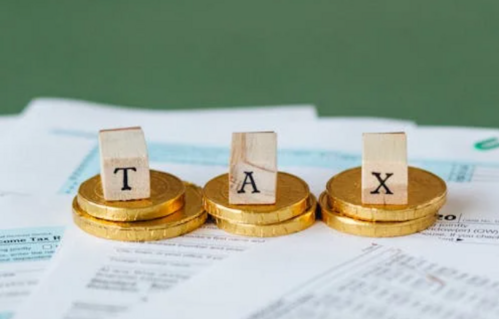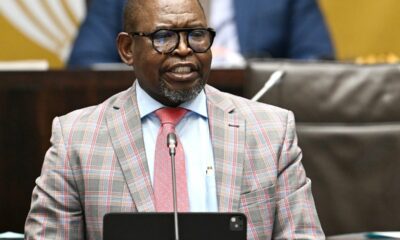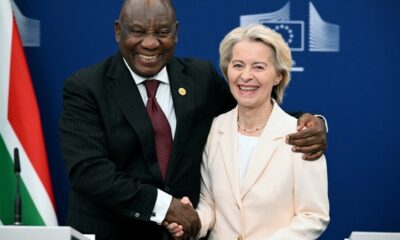Business
South Africans Brace for More Tax Hikes in 2026

South Africans may want to hold onto their wallets a little tighter. The National Treasury has signaled that more tax hikes are likely on the horizon, and they’re aiming to find a whopping R20 billion in extra revenue by 2026. The options being considered? Pretty much everything.
After avoiding a VAT hike in the May 2025 Budget, Treasury is now reviewing an array of tax ideas, many of which had previously been dismissed as politically unpalatable or economically risky. Now, they’re all back on the table.
The disappearing VAT hike and the price of its absence
When Finance Minister Enoch Godongwana stood before Parliament in May 2025 to deliver the third draft of the national budget, one major change stood out: the government had dropped its plans to increase VAT. That decision may have spared consumers from higher prices at the till, but it came with a hefty cost an expected R62 billion drop in revenue over the next three years.
To compensate, the Treasury had to look elsewhere. For now, 2025 will only see a small increase in the fuel levy, which hasn’t changed since 2022. Even this adjustment, the Treasury insists, is simply to keep pace with inflation, not to generate more revenue.
But for 2026? That’s when the real tax hunt begins.
The fuel levy’s quiet comeback
For years, South Africans have been spared from increases to the fuel levy as a form of relief, particularly during the VAT discussions. With VAT now off the table, Treasury quietly turned its attention back to the fuel pump. The logic is simple: the fuel levy is one of the biggest contributors to the country’s tax income, making up about 5% of total revenue, despite being VAT-free.
Interestingly, officials argue that the previous freeze on the fuel levy didn’t really benefit consumers. Transporters and retailers, they say, simply pocketed the savings. Prices remained high even when global oil prices dropped, and taxi fares barely budged.
The levy hike, they claim, could have a silver lining encouraging more efficient fuel use, nudging people toward cleaner transport, and promoting better driving habits. Still, for the average motorist, it feels like another hit to the pocket.
2026: The tax menu is wide open
With a R20 billion hole to fill in 2026, Treasury is now actively reviewing a wide range of tax proposals. Some have been floated before, others are new spins on old ideas. Here are some of the possibilities being tossed around:
-
Raising the top personal income tax rate
-
Slightly shifting tax brackets
-
Removing retirement fund deductions
-
Scrapping existing tax incentives
-
Hiking corporate income tax
-
Introducing a direct wealth tax
These aren’t just idle musings. Treasury has received formal proposals from commentators, advocacy groups, and policy think tanks all weighing in with their preferences, concerns, and alternatives.
Still, not everyone agrees with new taxes. Some argue that government should focus on tightening spending and improving tax collection. Others want authorities to crack down harder on illicit financial flows and tax dodgers before turning to everyday taxpayers for more.
The challenge of taxing the wealthy
A direct wealth tax is always a hot topic and a controversial one. Treasury points out that South Africa already taxes wealth in several ways, from capital gains to estate duties. Adding another layer might sound good politically, but could backfire economically.
Corporate taxes, too, are already seen as too high for South Africa’s global competitiveness. And history has shown that bumping up personal income tax doesn’t always bring in the revenue expected, thanks to behavioral changes and the so-called Laffer Curve.
Nonetheless, with pressure mounting to fund basic services, infrastructure and debt repayments, Treasury says “nothing is off the table.”
What’s definitely going up
While many of the proposals remain under discussion, there’s one certainty: alcohol and tobacco excise duties will keep rising. Treasury has made it clear that these so-called “sin taxes” will continue to outpace inflation, year after year.
That means a more expensive bottle of wine and pricier smokes are almost guaranteed.
A tough road ahead
South Africans are already feeling the pinch from rising living costs, slow job growth, and a wobbly economy. The idea of more taxes especially ones that target income or savings is understandably unsettling.
Yet Treasury finds itself in a tough spot. With limited space to borrow, a fragile currency, and high public expectations, something has to give. The 2026 Budget could mark a turning point in how South Africa funds its future.
Don’t just brace, engage
As these debates unfold, it’s vital that ordinary citizens, business owners, and community leaders stay informed and engaged. Public pressure and constructive feedback can shape the direction of tax policy, especially when fairness, transparency, and accountability are on the line.
Stay alert. Ask questions. Demand better.
Because when the next tax wave hits, you’ll want to know where it’s coming from and where your money’s going.
{Source: BusinessTech}
Follow Joburg ETC on Facebook, Twitter , TikTok and Instagram
For more News in Johannesburg, visit joburgetc.com



























